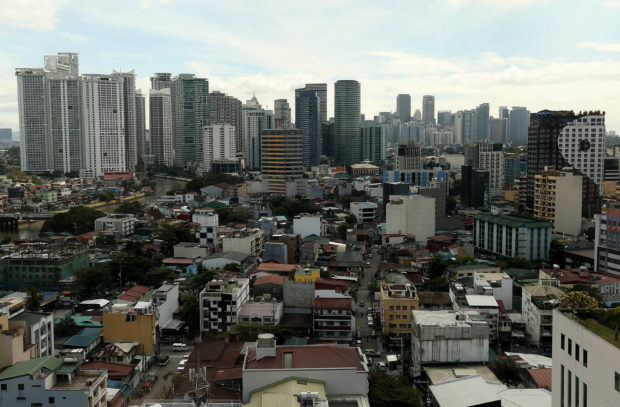Think tank: Outlook for investments in PH ‘deteriorating’

(file photo) The skyline of Makati Business District in Makati City. INQUIRER PHOTO / RICHARD A. REYES
MANILA, Philippines—Many investors in the Philippines aren’t in the mood to expand yet, think tank Pantheon Macroeconomics said on Monday (July 11) despite the Marcos administration eyeing a bigger private sector role in infrastructure and agricultural development.
“The outlook for investment in the Philippines is deteriorating,” said Miguel Chanco, chief emerging Asia economist at UK-based Pantheon Macroeconomics, in a report.
“The key findings of the Bangko Sentral ng Pilipinas’ (BSP) latest business expectations survey suggest that a smooth transition in government and President Ferdinand Marcos Jr.’s strong mandate alone won’t be enough to catalyze capex [capital expenditures],” Chanco said.
“The second-quarter survey was conducted between April 18 and June 1, so at least half — if not more — of the responses were made in the knowledge of Mr. Marcos’ landslide victory, which was positive from the standpoint of producing an indisputable result, but negative due to his lack of clear policy proposals,” he said.
Chanco noted that the survey’s confidence index for the current third quarter dropped to 46.4 percent from 59.7 percent, while the share of optimistic businesses declined by 2.5 percentage points (ppts) to 50 percent.
Article continues after this advertisement“However, the proportion of firms that have expansion plans in the quarter slipped for the second time in a row to 18.3 percent, staying some 10 ppts below the end-2019 level. The year-over-year change in this gauge suggests that the slowdown in capex growth resumed sharply in the second quarter,” Chanco added.
Article continues after this advertisementChanco said he was worried that the combo of what he described as “no ringing business endorsement for President Marcos Jr. to see” plus consumers’ depleting savings—no thanks to high inflation amid the prolonged COVID-19 pandemic—could temper economic rebound. “Crucially for the broader economy, the lift — and sturdy cushion — provided by household spending is unlikely to be as strong going forward. Intensifying headwinds are starting to weigh on the recovery in still-subdued long-run spending intentions.”
Last week, economic managers said the Marcos administration will turn to more public-private partnerships (PPPs) given a pandemic-induced limited fiscal space.
Socioeconomic Planning Secretary Arsenio Balisacan noted last Friday (July 8) that building up infrastructure financing from the private sector would free up resources for public social services such as education and health care.
Balisacan, who heads the state planning agency National Economic and Development Authority (Neda), reiterated that while the economic team preferred private proponents to bankroll solicited PPP projects—which formed part of the government’s infrastructure roadmaps—unsolicited pitches would still be accommodated as long as they complement the public investment plan.
Finance Secretary Benjamin Diokno said the economic team planned to bid out the operations and maintenance (O&M) of some airports, like the Bohol International Airport built by the government, to private contractors.
The previous Duterte administration had shunned PPPs, especially unsolicited projects, as it did not want disadvantageous provisions like government guarantees, subsidies, and material adverse government action (Maga) clauses. But the pipeline of big-ticket infrastructure projects included in the ambitious “Build, Build, Build” program it left behind had 20 unsolicited PPP projects worth P1.5 trillion to be financed by tycoons’ deep pockets.
Balisacan last week said that Neda, under his watch, “will ensure that comments on the revised IRR [implementing rules and regulations] of the amended BOT [Build-Operate-Transfer] law for PPPs are heard and carefully considered.”
Business groups have been jittery about the revised BOT Law IRR approved by former president Rodrigo Duterte’s economic team, which not only shielded the government from arbitration, but also provided “anti-market” definitions of contingent liabilities arising from PPP projects.
Contingent liabilities included Maga clauses, force majeure, breach of government warranties, as well as failure to deliver contractual obligations.
Former Neda chief Karl Kendrick Chua had said the amended BOT law IRR would protect Filipinos from contingent liabilities arising from PPP projects’ “high” return on investment (ROI), which private firms charge and the government shoulders, and ultimately paid for by consumers who use these infrastructure.
The Cabinet-level Development Budget Coordination Committee (DBCC) had projected the contingent liability stock—or the aggregate amount wrought by PPP projects—to have risen to P456.2 billion in 2021 from the estimated P311.8 billion in 2020. It was on top of the P60.4-billion “flow” of contingent liabilities or the amount which “may materialize within a specific interval of time taking into consideration a project’s risk factors” among 18 national PPP contracts signed between 2008 and 2020.